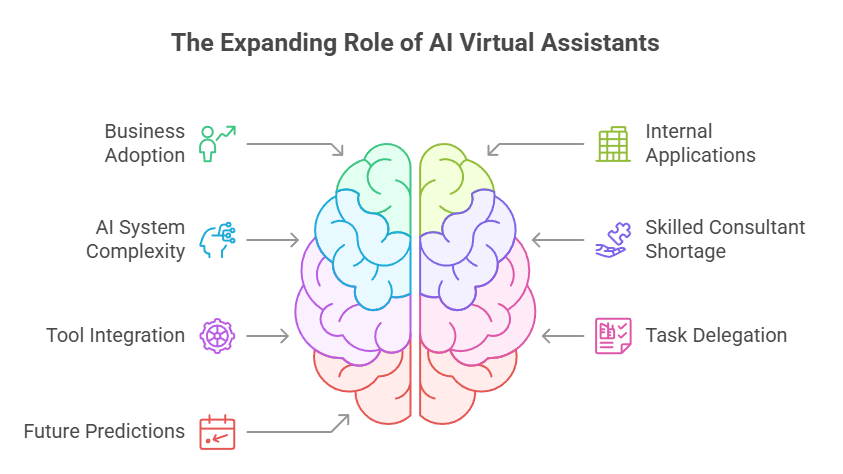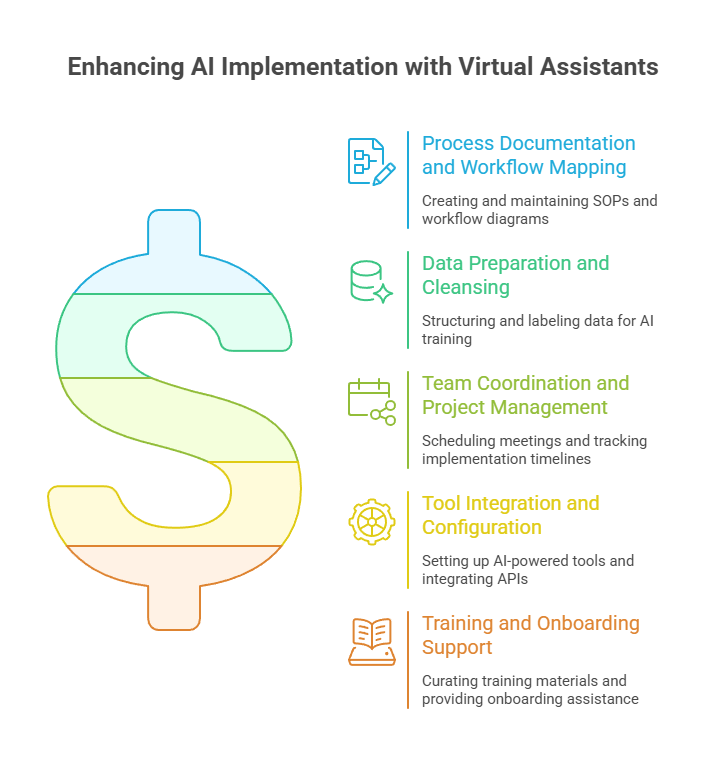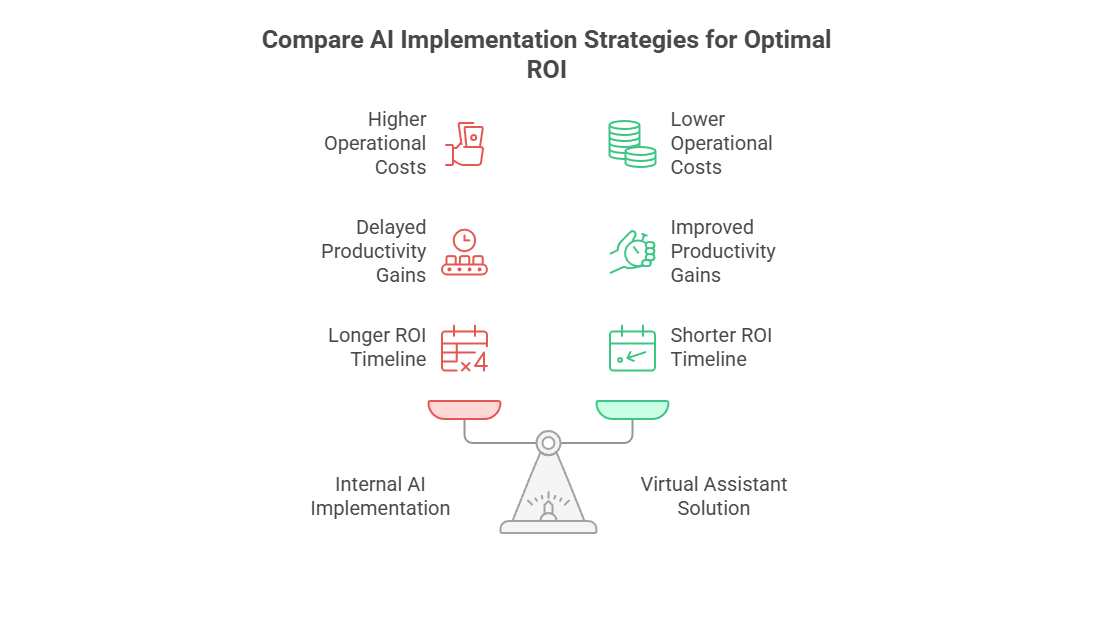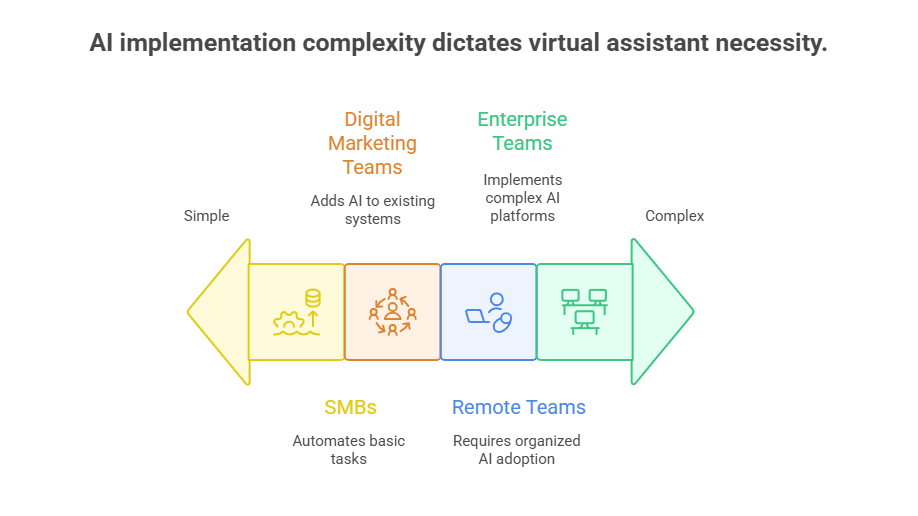
Why A Virtual Assistant For AI Implementation Is The Smartest Investment
As artificial intelligence (AI) rapidly redefines how organizations operate, the implementation process itself has become a complex and resource-heavy task. From data readiness to change management, deploying AI isn’t just about plugging in new tech—it’s about aligning human processes with intelligent automation. This is where a Virtual Assistant for AI implementation becomes a strategic necessity, not just a luxury.
Whether you’re a mid-sized firm in the UK planning its first AI rollout or a US-based enterprise scaling machine learning models, leveraging a dedicated virtual assistant can accelerate adoption, reduce costs, and ensure continuity in human-AI collaboration.
Understanding the Rise of AI-Driven Virtual Assistants

Virtual assistants are no longer limited to scheduling meetings or filtering emails. Today, they serve as AI enablers—capable of managing technical documentation, onboarding internal teams, automating repetitive steps in deployment pipelines, and more.
According to WiFiTalents, over 60% of businesses already use AI-driven virtual assistants, and that number is projected to climb swiftly in the coming years. These assistants aren’t just for customer-facing roles. They’re increasingly deployed internally to assist with complex implementations like ERP setups, cloud migrations, and, most recently, enterprise-level AI deployment.
This shift is driven by several trends:
-
The growing complexity of AI systems, especially in areas like natural language processing, predictive analytics, and machine learning model training
-
A shortage of skilled AI implementation consultants, which makes task-oriented delegation to remote VAs more attractive
-
Increasing integration of AI copilots into core business tools like Microsoft 365, Slack, and Salesforce, which require administrative setup and configuration
Virtual assistants trained in AI frameworks can handle up to 30–60% of technical and logistical support tasks, significantly easing the burden on internal tech teams.
Additionally, Gartner predicts that by 2026, 80% of enterprises will have used AI-infused digital workers—like VAs—for internal operations, illustrating how vital these roles are becoming.
How a Virtual Assistant Supports AI Implementation

The job of a virtual assistant in AI implementation extends far beyond general support. Their role can be broken down into several specialized functions that directly impact the efficiency and success of an AI project:
1. Process Documentation and Workflow Mapping
AI systems rely heavily on well-documented workflows to train models and establish automation protocols. Virtual assistants can create and maintain SOPs, diagram implementation flows, and standardize processes across departments. This ensures your AI deployment isn’t derailed by inconsistent documentation.
2. Data Preparation and Cleansing
Before AI can be trained, data must be structured, labeled, and quality-checked. A virtual assistant can assist with data annotation, database maintenance, and basic ETL (Extract, Transform, Load) operations, making them a valuable asset in early-stage AI readiness.
3. Team Coordination and Project Management
From scheduling meetings between data scientists and business analysts to tracking implementation timelines, VAs act as virtual project coordinators. They actively guide each team member through critical AI rollouts and keep everyone aligned throughout the implementation.
4. Tool Integration and Configuration
Virtual assistants can set up AI-powered tools—like chatbots, automation software, or CRM enhancements—across your digital workspace. Whether it’s integrating OpenAI APIs or configuring Zapier for AI-triggered workflows, they bring hands-on technical execution to your broader AI vision.
5. Training and Onboarding Support
Change management is one of the most overlooked aspects of AI adoption. VAs can curate training material, record how-to videos, and provide real-time onboarding assistance to help teams adapt to new tools.
When a skilled virtual assistant handles these roles, companies report a reduction in AI implementation cycles by up to 25–40%, along with significantly improved team adoption rates.
Forrester adds that leveraging AI assistants in internal operations improves both speed and employee satisfaction, as repetitive work gets offloaded and focus shifts to strategic tasks.
Tangible ROI: Time, Cost & Productivity Gains

Implementing AI with internal staff alone can become a massive drain on resources. Between the time spent in training, coordination, and tool integration, most companies end up overextending technical teams and delaying returns. Hiring a virtual assistant is a cost-effective solution to this problem.
According to WiFiTalents, AI-powered virtual assistants can:
-
Save up to 30% in operational costs
-
Improve internal productivity by 15–20%
-
Deliver ROI in under 6 months when paired with enterprise software tools
The same report notes that businesses using VAs in AI deployment see improved cross-departmental alignment, fewer technical bottlenecks, and higher project completion rates on schedule. For companies in both the US and UK, where operational costs are rising and AI competition is fierce, these gains are particularly impactful.
McKinsey estimates that generative AI could boost productivity by up to $4.4 trillion annually, but businesses can unlock this value only with proper implementation—something virtual assistants actively support.
Who Needs a Virtual Assistant for AI Implementation?

If your business falls into any of the following categories, the value of such a VA becomes non-negotiable:
-
SMBs adopting AI for the first time (e.g., automating emails, customer insights, or business intelligence)
-
Enterprise teams rolling out large-scale AI/ML platforms
-
Digital marketing or CRM teams adding AI layers like sentiment analysis or predictive lead scoring
-
Remote-first or hybrid teams where AI adoption requires structured communication
In the UK, where 61% of firms report AI-readiness gaps, a virtual assistant can act as the bridging layer between intention and execution.
Why TaskVirtual Is the Ideal Partner for AI Implementation Support
If you’re considering hiring a virtual assistant for AI implementation, TaskVirtual offers the ideal blend of affordability, expertise, and customization.
Here’s what makes TaskVirtual stand out:
1. Expert Consultation on AI-Powered Efficiency:
Their assistants actively use and master popular AI deployment tools, automation platforms, and no-code/low-code solutions.
2. Affordable Pricing:
With rates starting from just $3.12/hour to $14.99/hour, you get enterprise-level assistance without the enterprise-level price tag.
3. Proven Track Record:
With 364 positive reviews and a 4.7-star rating on leading VA review platforms, TaskVirtual is a trusted partner for tech-forward businesses.
4. US and UK-Centric Support:
Assistants work in your time zone and understand regional tools, regulations, and help boost productivity.
5. Custom Implementation Plans:
Whether you’re using ChatGPT APIs, Salesforce Einstein, or Microsoft Azure AI tools, TaskVirtual provides assistants trained in your specific tech stack.
Most importantly, TaskVirtual doesn’t just offer manpower—they bring strategic value to your digital transformation journey.
Final Thoughts: Don’t Just Implement AI—Implement It Smartly
In 2025, it’s not enough to use AI. The competitive advantage lies in how effectively you implement it.
A Virtual Assistant for AI Implementation acts as your behind-the-scenes catalyst—handling logistics, guiding workflows, enabling human-AI synergy, and driving down costs. Whether you’re streamlining internal workflows or launching a new AI product suite, the strategic integration of a virtual assistant can define your success timeline.
By investing in a partner like TaskVirtual, you’re choosing scalability, affordability, and precision—the three pillars of successful AI deployment in a hyper-digital business landscape.







Really insightful! The idea of using a VA specifically for AI implementation is such a practical solution—especially for businesses that want to stay agile without overwhelming their teams. I like how you framed it as a catalyst rather than just a support role. With the right VA, even complex AI rollouts can feel much more manageable. Definitely a smart investment in today’s fast-moving digital space!